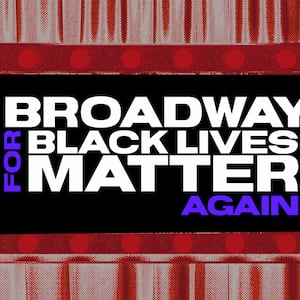Ruben Santiago-Hudson is one person, but in Lackawanna Blues—the show the Tony Award-winning performer has written, performs and directs, opening tonight at Broadway’s Samuel J. Friedman Theatre—he becomes a voice of many. And, thanks to Santiago-Hudson’s dexterity of interpretation, the many characters he embodies immediately become familiar and intriguing to us.
The key relationship in this 90-minute, Obie and Helen Hayes-award winning show—originally staged in 2001 by the Public Theater, and which Santiago-Hudson adapted for HBO four years later—is between him and his surrogate family, Ms. Rachel Crosby (“Nanny”). She had a soft voice and a bearing that was kind, understanding, yet also streaked with steel. She could give the best hugs, and you did not want to mess with her.
“Everybody called Nanny, ‘mother,’” he says.
Santiago-Hudson, who recently adapted Ma Rainey’s Black Bottom for Netflix, sketches their relationship from when he was a small boy through to her deathbed, alongside characters Santiago-Hudson recalls from the Black community of Lackawanna, NY, where, beginning in the 1950’s, Nanny oversaw rooming houses.
As well as charting their loving relationship, we meet a gallery of rooming house characters and townsfolk who are funny, sad, colorful, tragic, resilient, and vivid. Santiago-Hudson’s virtuosity is aided by Grammy-nominated guitarist Junior Mack, artfully accompanying his storytelling on guitar with original music composed by Bill Sims Jr—to whose memory the show is dedicated. There are occasional, delicious flourishes of Santiago-Hudson playing the harmonica.
The show begins in 1956, with Santiago-Hudson regaling us with Lackawanna as boomtown, “jobs everywhere, money everywhere,” and the aroma of fried fish, chicken, and pork chops in the air. Nanny brought her Virginian family up north, providing food, shelter, and clothing. “Nanny was like the government if it really worked,” Santiago-Hudson says. Her goodness “stretched beyond reason,” including raising a raccoon that got so used to his breakfast—“always two eggs scrambled, soft, with toast”—that it would position themselves on top of her refrigerator every morning, “screaming, bobbing up and down.” Santiago-Hudson himself was happiest eating liver and onions on Wonder bread.
Nanny always made Santiago-Hudson feel loved, telling him he was a breath of fresh air, and that they would always be together. He recalls the rooming house characters, like Lottie with a Lucky Strike always dangling from her lips; and a shadier rooming house full of ramblers, drifters, ex-prisoners, and those tied with “gambling, prostitution, pimping...or the Church.”
Lackawanna Blues doesn’t tell Santiago-Hudson’s personal story, or Nanny’s. Rather, it is a series of glancing character studies. Ol’ Po’ Carl, a former Negro Leagues baseball player, relates what the game was like at a time of segregation. There is “Numb Finger Pete,” who once tried to walk home to South Buffalo, falling in the snow, his exposed hands so frostbitten they had to be amputated below the second joint, apart from his left hand’s ring and pinkie finger which—what was left of them—fused together.
Pete eventually fights Mr. Lemuel Taylor, who only has one leg, in the “numb finger, one-legged fight of the century.” Santiago-Hudson recalls Mr. Taylor as a small man with a barrel chest in a too small cardigan from which lint balls “dangled like Christmas ornaments.” Mr. Taylor later throws a rock across a creek, and “taking flight” as he does so. “Are you gonna let a one-legged man chuck a rock farther than you?” he asks of a young Santiago-Hudson.
Santiago-Hudson is a master storyteller of the singular and familiar—this is a slice of personal and Black history made present and tangible, as the exclamations of recognition from many in the audience the night this reviewer saw it made clear. Michael Carnahan’s simple set is a backdrop of one of the red-bricked rooming houses; occasionally rooms are lit up as if we too are on those streets with him again, and history itself has emerged from its membrane of the past right in front of us—especially at visceral moments such as when Nanny calmly and commandingly confronts a domestic abuser, whose wife has sought shelter with her.
Time does its relentless thing, of course—and the end of the play sees Santiago-Hudson facing Nanny’s mortality. She tries to ease his upset by telling him that, “The only thing you know for sure when you come into the world is that one day you’re going out of it. Death is your friend when this long, hard journey is over.” They will always be together, she tells him, because he is her baby. Lackawanna Blues is a beautiful testament to their relationship, and the wider community surrounding it.







